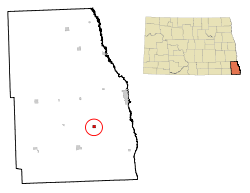Great Bend, North Dakota
| Great Bend, North Dakota | |
|---|---|
| City | |

Street in Great Bend
|
|
 Location of Great Bend, North Dakota |
|
| Coordinates: 46°9′12″N 96°48′11″W / 46.15333°N 96.80306°WCoordinates: 46°9′12″N 96°48′11″W / 46.15333°N 96.80306°W | |
| Country | United States |
| State | North Dakota |
| County | Richland |
| Founded | 1888 |
| Incorporated (village) | 1908 |
| Incorporated (city) | 1967 |
| Named for | Bend in the Wild Rice River |
| Area | |
| • Total | 0.55 sq mi (1.42 km2) |
| • Land | 0.55 sq mi (1.42 km2) |
| • Water | 0 sq mi (0 km2) |
| Elevation | 974 ft (297 m) |
| Population (2010) | |
| • Total | 60 |
| • Estimate (2014) | 59 |
| • Density | 109.1/sq mi (42.1/km2) |
| Time zone | Central (CST) (UTC-6) |
| • Summer (DST) | CDT (UTC-5) |
| ZIP code | 58075 |
| Area code(s) | 701 |
| FIPS code | 38-32900 |
| GNIS feature ID | 1029232 |
Great Bend is a city in Richland County, North Dakota, United States. It sits on the banks of the Wild Rice River. The population was 60 at the 2010 census. Great Bend was founded in 1888, and incorporated as a village in 1908. It is part of the Wahpeton, ND–MN Micropolitan Statistical Area.
Great Bend was founded in 1888 on land homesteaded by George Worner (1855 – 1950). He was born in Germany and moved to Brandenburg Township in 1874 when his family moved there from Wisconsin. In 1875, Worner established a rural post office on his land near here, and named it Berlin in honor of the German capital. The post office was later moved in 1882 to a site closer to Great Bend and was disbanded on July 12, 1883. Worner was instrumental in the town's founding and development, serving as one of the first station agents for the Northern Pacific Railroad, operated the first general store, and served as one of the town's first postmasters. He later served in the North Dakota House of Representatives.
Great Bend is located at 46°9′12″N 96°48′11″W / 46.15333°N 96.80306°W (46.153413, -96.803000).
...
Wikipedia
